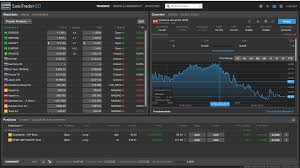The Steps and Terms of Online Investing by Melvin Feller MA
The Steps and Terms of Online Investing by Melvin Feller MA
As
with everything else these days, the stock market has gone online.
Therefore, Melvin Feller MA asks if you can shop, pay bills, and do your
banking online, why not invest too? Investing online is not as big of
an ordeal as some people make it out to be. Melvin Feller suggests that
the key is to know what you want before you start.

When
opening a new account, according to Melvin Feller, investors need to
answer the regular questions, such as the type of account they want and
how it will be funded. When selecting an account type the kind you
choose will depend on whether or not the account is taxable or
tax-deferred, and whether it is for just you or you and someone else.
You
will also have to decide whether your account will be “cash” or
“margin.” A cash account means you are only able to place trades for
investments with money in your account. A margin account gives you a
credit line from your brokerage firm. You can also have a “margin
account with options,” which means you are purchasing the right to buy
and/or sell a stock at a specific price. Options are quite complicated
and usually only purchased by traders with experience and large
portfolios.
After
choosing the type of account, money must be deposited. The initial
deposit can be sent to the firm by check or an automatic transfer from a
bank account. Another option is transferring an account from a
different brokerage firm, but the process is quite lengthy and can take
months to complete.
If
you are trying online investing for the first time, start small. Do not
put every penny of your life savings into an online account. A smaller
sum is easier to handle and easier to keep track of. When you feel
confident and are ready, then you can expand your online account.
According
to Melvin Feller, another good thing to do when investing online is to
try and stay diversified, in other words don’t concentrate all of your
portfolio on just one thing, instead develop a well-balanced portfolio
of stocks, bonds, and cash.

Many
brokers will encourage you not to bail out on mutual funds. The main
reason most investors are in mutual funds are that they do not have the
experience to make their own calls on stocks.
They
are also occupied with other things besides just watching the stock
market. Keeping your mutual funds can be a wise decision instead of
prematurely “playing the market” in individual stocks.
It
is important to remember that online brokerage firms add fees and
charges that need to be looked at closely. Before buying and selling
large-scale stocks online, look at what the tax results are of such
trading. The average online brokerage costs are lower than full-service
brokers are, but fees can still add up.
Remember
that just because you are investing online, the Internet is not
foolproof and you are bound to run into some problems. There will surely
be times when you are unable to gain access to your account. You’re
connection could be down, the brokerage firm’s server could crash if
trading is overly heavy, you could experience a software glitch, or you
may be away from your computer when there is a major market move. Always
be prepared for these things and keep in mind the available alternative
trading options such as phone trading.
When
investing online it is your responsibility to say as informed as
possible. Do not just settle for what you hear. Instead, do a little
research on a company before investing in them. There are services that
send you automatic e-mail messages over news about your stock take
advantage of these.
Remember in online investing everything is up to you and knowledge is power.
Here are some terms to be familiar with.

After Hours Trading
After-hours
trading is the trading of securities, such as stocks and bonds, on
organized markets and exchanges after regular business hours. These
after-hours, electronic transactions explain why a security may open
during regular business hours at a price that is different from the one
it closed at the day before. Some interpret the level of activity and
the direction the after-hours trading — up or down — as an early
indicator of what may happen in the market the following day.
Brokerage Firms
Brokerage
firms are licensed to buy and sell securities for clients and for their
own accounts. Brokerage firms provide individual investors their link
to the financial markets by employing brokers who carry out the
investor’s order to buy or sell securities.
The
firm may be a huge, corporation with hundreds of brokers, a small
partnership with only one broker or any size in between. A brokerage
firm could also be a full-service firm, a discount firm or somewhere in
between. Typically, larger firms, and full-service firms, provide an
increasing range of financial services, including financial planning,
asset management, and educational programs. In addition, many maintain
research departments for their own and their clients’ benefit. Other
brokerage firms, such as online firms and discount firms, are
increasingly providing their customers with a wealth of investment
information on their websites and encouraging their customers to trade
electronically.
An
investor should note that while online and discount brokerage firms may
charge lower commissions than full-service brokerage firms to execute
their buy and sell orders, those firms are less likely to provide the
range of services mentioned above. This may not be an issue for many
investors as extensive information and online account access are now
readily available. The individual investors’ needs will dictate which
services will be required.

Cash Accounts
Requiring
that you pay for the securities transaction in full, this is the most
common type of investment account. Customers who invest in securities
using only the money they currently have available in their brokerage
account use this account.
Day Trading (Day Traders)
This
is a trading strategy in which the investor buys then sells, or sells
short then buys, the same security on the same day in an attempt to
profit from small movements in the price of that security. The strategy
is to take advantage of rapid price changes to make money quickly.
This
is a legal investment strategy; however, it is also highly risky and
should be reserved for more experienced investors. Most of us do not
have the wealth or time to make money by day trading, much less the
ability to sustain the devastating losses that it can bring.
Dow Jones Industrial Average (DJIA)
Frequently
referred to as the Dow, this is the best-known and most widely followed
market indicator in the world. It tracks the performance of 30 blue
chip US stocks. Despite the fact that it is called an average, the Dow
is actually a price-weighted index. This means that the gains and losses
of the highest priced stocks are counted more heavily than gains and
losses of lower priced stocks. In response to financial conditions, new
companies may be added to the DJIA while existing companies may be
dropped.

Diversification (Diversified)
This
is an investment strategy wherein the investor spreads their investment
dollars among different markets, sectors, industries, and securities.
By adopting this strategy, the investor seeks to protect the value of
their overall portfolio in the event that a single security, industry or
market sector takes a serious downturn and drops in price. Studies have
shown that
diversification
can help secure your investments against market and management risks
without sacrificing the level of return desired.
Establishing
a well-diversified portfolio will depend on the investor’s age, assets,
risk tolerance and investment goals. The securities mix that is right
for you may include small-, medium-, and large-cap domestics stocks,
stocks in multiple sectors or industries and international stocks.
ECN’s (Electronic Communications Networks)
This
technological advancement completes trade orders electronically, from
start to finish, and maintains each order as part of an electronic
record. When new orders are entered, the system automatically checks
them against existing orders to see if there is a match — a buyer
offering what a seller is asking. If there is a match, the system will
execute the deal immediately without involving a specialist.
Since
matches are made anonymously, large institutional investors have the
ability to make trades without attracting attention or creating
speculation about their possible motives. An additional advantage of the
ECNs is that they make it easy to trade after-hours, when the markets
are closed; however, ECNs are accessible only to its members.
IPO’s (Initial Public Offerings)
As
a company grows larger, it may decide to go public by issuing stock, or
adding shareholders, through an initial public offering (IPO). The
purpose of issuing stock and adding shareholders may be to raise
capital, to provide liquidity for the existing shareholders, or a number
of other reasons. When planning to issue an IPO the company must
register its offering with the Securities and Exchange Commission (SEC).
Typically, the company will work with an investment bank, which
underwrites the offering by purchasing all of the shares at a
predetermined price and then reselling them to the public in hopes of
making a profit.

Limit Order
Limit
orders allow the customer to specify the price at which he or she is
willing to buy or sell a security. While limit orders can help investors
avoid buying or selling security at an undesirable price, thereby
protecting them from the possibility of rapid price changes, there is
the risk that the limit order will not be executed (i.e., the market
price may quickly surpass your limit before the order can be filled). In
addition, some firms may charge you more for executing limit orders.
Liquidity
Liquidity
refers to the ease with which an investment can be converted to cash.
The more liquidity the investment is said to have, the easier it will be
for the investor to convert it to cash.
Margin
Within
a margin account, the margin is the portion of the purchase price that
the customer must deposit into the account. This portion may also known
as the customer’s initial equity in the margin account.
Margin Account
This
account allows the investor to increase their purchasing power by
borrowing money from a brokerage firm to invest in securities. The money
that the investor borrows must be repaid and the investor must possess
collateral in their margin accounts in the form of securities in the
event that they are unable to repay their brokerage firm. In the event
that the investor is unable to pay the brokerage firm for a margin loss,
the investor may be forced, with or without their knowledge, to
liquidate the securities in their margin account. The investor’s
liability may also extend beyond the value of the securities in their
margin account. In addition, the investor must pay applicable margin
interest for borrowing the money from their brokerage firm. While buying
securities on margin may equate to greater profits than an investor
would receive simply using their own resources, those profits must
exceed the margin borrowing expenses in order for the investor to
profit.
Buying on margin is risky and the investor should understand the principles and risks entirely before trading on margin.

Margin Account with Options
This
is a margin account with the opportunity to purchase options. By
purchasing an option, the investor has the right to buy or sell a
specific security at a specific price, called a strike price, during a
predetermined period.
If
the investor buys an option to buy, known as a call, they will pay a
one-time premium -a fraction of the cost of the actual transaction. For
example, an investor might buy a call option giving them the right to
buy 500 shares of a particular stock at a strike price of $100 a share
when that stock is currently trading at $85 a share. In the event that
the prices goes higher than the strike price, the investor would want to
exercise the option and buy the stock at the lower cost per share, or
even trade that option with someone, in either case experiencing a
profit. If the stock price did not go higher than the strike price, the
investor would simply choose not to exercise the option and that option
would expire. The only money that investor would have lost was the money
paid for the premium.
Similarly,
an investor may purchase a put option, which gives them the right to
sell the security to the person who sold them the option. In this case,
the investor would exercise the option if the market price dropped below
the strike price.
Trading in options is a risky investment opportunity and should be reserved for more experienced investors.
Margin Call
In
a margin account if the investor falls below the margin requirements,
they may be subject to a margin call wherein the brokerage firm asks for
additional funds to be added to the investors account. In the event
that the investor is unable to pay the brokerage firm for a margin call,
the brokerage firm may sell part or all of the securities held in the
margin account, with or without
the investor’s knowledge, in order to make up the value and meet the margin limit requirements.
Margin
calls can occur suddenly and investors should understand fully the
financial impact that trading on margin can have on the value of their
accounts.

Market Order
This
is an order in which the investor instructs his or her brokerage firm
to buy or sell as security at the current market price, ideally as soon
as possible. Unless the investors specifies otherwise, a broker will
enter the order as a market order.
The
advantages of a market order are that the investor is usually
guaranteed that their order will be executed (as long as there are
willing buyers and sellers) and a market order is typically less
expensive than a limit order.
The
disadvantage of a market order is that the investor has no control over
the price at which their order will ultimately be filled. If the price
of the security is moving quickly and there is a delay in the execution
of the market order, then the price at which the investor buys or sells
the security may be quite different than what they expected with the
market order was originally placed.
Minimum Maintenance Requirement
With
regards to trading on margin the amount that an investor can borrow is
limited by both the Federal Reserve Board and the specific brokerage
firm used. Generally, there are two requirements — how much margin an
investor can use initially in the margin account and then how much
margin they can have once the initial transaction has been executed.
While each brokerage firm creates its own requirements, typically, in
the initial transaction, 50% of the purchase price of any security can
be margin. Once the initial transaction has been executed, the
maintenance margin account requirement is usually much lower, often
around 25%. Investors should consult with their individual brokerage
firms to determine the initial and ongoing maintenance margin
requirements.

Mutual Funds
Mutual
funds pool money from several investors (individual and/or
institutions) and invest the pooled money in various types of
investments (i.e., stocks, bonds, specific industries, etc.). Investment
decisions are based on the common financial goals of the investors. The
suitability of a particular mutual fund depends on the types and nature
of the fund’s investments and the amount of diversification. Not all
mutual funds are equal and investors need to determine if the goals of a
particular mutual fund match their own personal financial goals.
The
advantages of mutual funds are diversification, liquidity, and
professional management. By pooling money from many investors,
individual investors are able to own more securities than they might be
able to afford on their own; therefore, owning a mutual fund may offer
the investor instant holdings in several different companies. In terms
of liquidity, mutual fund investments can be converted to cash upon
request. Rather than managing your investments yourself, a mutual fund
allows you to turn over the responsibility to a “professional.”
Online Broker Ratings (ratings/rankings)
In
general, online brokerage ratings indicate the level of customer
service or satisfaction with the online brokerage firm. There are
several sources of online broker ratings and each may use different
criteria in their ratings. In addition, the online broker ratings
sources are not regulated entities. Investors should keep in mind that
while a brokerage firm may be ranked #1, that is in terms of customer
satisfaction and it does not mean that they will have a better chance of
making you money.
Prospectus
A
written, legal document outlining the investment offered for sale. A
prospectus provides all of the material information about an offering of
securities, and serves as the primary sales tool of the company issuing
the security and broker-dealers who sell the security.
The
prospectus is also serves as written proof that the investor was given
all the material facts as they are set out in the prospectus. It is for
this reason that investors should be certain that they understand the
information contained the prospectus.

Stop Loss Order
A
stop loss order instructs a broker to sell a specific stock it if falls
to a certain price. This is a useful tool in preventing investor
losses. For example, you buy ABC Company at $100 a share and you
instruct your broker to sell if it falls to $90 a share. On a given day,
the stock falls to $80 a share. Your broker sold your shares when they
reach $90 thereby saving you an additional $10 per share loss on your
investment.
Suitability
The
suitability of an investment depends on whether the investment in
consistent with the person’s investing objectives and profiles (age,
financial status, long-term goals, income, current financial status,
etc.). Investment advisors and brokers giving investment advice are
required by law to ensure that their recommendations are suitable for
the investor. To help these financial professionals make appropriate
recommendations an investor should provide honest and accurate
information to that professional.
Stocks
Stocks
represent individual ownership in a company. A share of stock is
equivalent to a proportional share of ownership in a company. The goal
of stock ownership is to see the value of the company increase over
time. As the value of the company changes, the value of the share in
that company rises and falls.
Taxable versus Tax-Deferred
A
taxable investment refers to investments in which the earnings will be
taxed as they are received. A tax-deferred investment refers to
investments in which the tax is not paid as earning are received but
will be due when the untaxed money is withdrawn from that tax-deferred
account.

Melvin Feller is known as “The Entrepreneur’s Mentor” because Melvin walks his talk.
Melvin Feller has been there and done that and more importantly, Melvin
Feller knows how to transfer the skill set for success. This is main
reason that he has been the sought after coach to hundreds of small
business owners, entrepreneurs, Realtors, real estate investors and
service professional internationally. Melvin
Feller’s main talent is to show you how the step by step process to
build and enjoy a successful 6-figure plus business while having a
balanced life. Melvin Feller maintains offices in Texas and Oklahoma.
Melvin Feller MA is in Texas and in Oklahoma.
Melvin Feller founded Melvin Feller Business Group in the 1970s to help
individuals and organizations achieve their specific Victory. Victory
as defined by the individual or organization are achieving strategic
objectives, exceeding goals, getting results or desired outcomes. He has
extensive experience assisting businesses achieve top and bottom line
results. He has broad practical experience creating WINNERS in many
organizations and industries. He has hands-on experience in executive
leadership, operations, logistics, sales, program management,
organizational development, training, and customer service. He has
coached teams to achieve results in strategic planning, business
development, organizational design, sales, and customer response and
business process improvement. He has prepared and presented many
workshops nationally and internationally.
Comments
Post a Comment